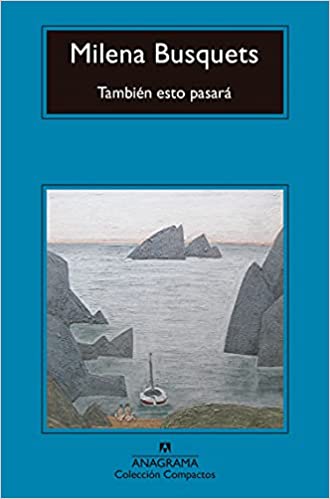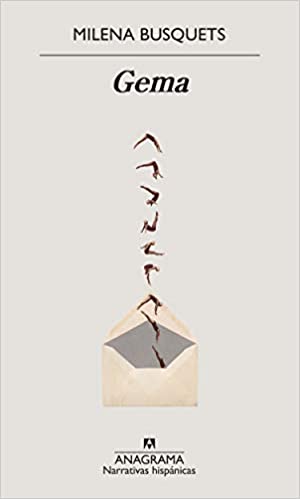We talk today about Milena Busquets Tusquets or how the cacophony plays in favor of keeping the name of an author indelibly. Although certainly the surname Tusquets already does its work in that of the quick associations with the literary. Because yes, Milena belongs to a traditional publishing clan where she herself has ended up emerging as a great storyteller.
And that is where one considers the context and circumstances as something very appropriate to forge the professional on duty, be it a footballer or a writer in this case. Because you are what you eat and what you know. And undoubtedly Milena met the best of Spanish literature to end up taking the pleasure of facing the blank page.
In her novelistic facet itself, Milena approaches very close settings from which to project a viewing existential. Something as if life could be seen as a sum of scenes, with that mixture of disturbing pleasure in observing others and the desire to know precisely the deep motives that move them. Because by knowing what moves others, we can end up clarifying what moves us.
Top 3 recommended novels by Milena Busquets Tusquets
This too will pass
You never quite know if you are doing it right when it comes to addressing childhood and truth. It may even be that so many Wise Men and fairy mice are a distortion that does not help at all in the adolescent feeling of having been "deceived" for years about a fantastic world that is rapidly receding. From that idea begins this novel of childhoods and contrasts, of duels always at the wrong time and longings to return to lost laps...
When she was a child, to help her overcome the death of her father, Blanca was told a Chinese story by her mother. A story about a powerful emperor who summoned the wise men and asked them for a phrase that would serve all possible situations. After months of deliberation, the sages presented themselves to the emperor with a proposal: "This too will pass." And the mother added: "Pain and grief pass, as euphoria and happiness pass."
Now it is Blanca's mother who has died, and this novel, which begins and ends in a cemetery, speaks of the pain of loss, of the tear of absence. But in the face of that pain, the memory of what was lived and how much learned was left, and the reaffirmation of life through sex, friends, children and men who have been and are important to Blanca gains strength. All this in the course of a summer in Cadaqués, with its untamed landscapes and its intense Mediterranean light that bathes everything.
Gem
Melancholy is the happiness of being sad, as that person would say. The problem for the protagonist of this novel is that one of those moments in which memories come to transport you a little, in her case, are not just foam from the waves. Those waves that immediately retreat, dissolving into whispers of longing. Because without a doubt the traumatic has a taste for flashbacks. And there she is, living moments that no longer belong to her...
The life of a forty-something-year-old writer goes smoothly, between her two children and a relationship that seems about to end. But that reasonably placid existence is shaken by the reappearance of a ghost from the past in the form of a sudden memory: Gem.
Gema was a schoolmate who died of leukemia at the age of fifteen, one of the two deaths that marked her childhood; the other was her father's, but he had lived a lifetime, while Gema left early. What existence would it have had? Who would it have become? When did you last see her? Could you say goodbye to her? Why has time been diluting the memory of the dead friend?
Trying to rescue Gema from oblivion, the narrator begins an investigation that will lead her to meet with old friends who also knew her, to look for a group photo of the class, to visit the school, to trace obituaries in a newspaper, to investigate about what happened to the restaurant that the girl's parents had ...
This is a novel about the past that we believe we have forgotten, but that haunts us, about the losses that mark us and the need to say goodbye. But it is also a novel about the desire to live and the small joys of everyday life, about love – for lovers, for children – and about the friendships that accompany us even after we disappear.
The book, at once light and deep, vitalistic and contrite, confirms the talent of Milena Busquets after the extraordinary international success of her previous novel, This too will pass, and allows you to enjoy once again your unique ability to address emotions and feelings with an inimitable style that has earned you a legion of loyal readers.
Elegant men and other items
We end up with a volume of stories, of small and uncertain scenarios, where anything can happen. Improvisation tints to get out of the way of life, as we all do. Emotions that arrive and destroy and pains that pass through without ever discovering the edge...
Characters of our world loaded with suitcases full of anecdotes and details that only happen when nobody sees them. The particularity of the author and the generality of personalities to be discovered as fetishes of what they are, that is, the person they inhabit.
The texts gathered here are like snapshots, like vignettes, like sketches in a painter's watercolor notebook. They combine without shame or the need for excuses a healthy frivolity and an acute ability to reveal what is not evident.
Many times they address the everyday, which can sometimes seem trifling to the inattentive eye, and from this they extract a smile, a poetic nuance, an epiphany. They are texts in which, above all, the shrewd, fresh and groundbreaking gaze of a writer capable of going beyond the obvious and predictable is guessed, capable of turning the articles she writes into light, substantial and seductive literary filigree.



